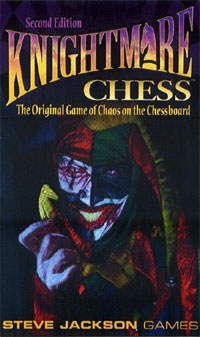Tagline: “Chess will never be the same!” This innocent looking pack of 80 cards completely alters the game of Chess – from a static strategic puzzle to a dynamic tactical conflict. Moody and evocative art by Rogerio Vilela. Translated from the original French.
I actually have quite vivid memories of writing this review. It was the first time I really became aware of how thoroughly I’d been bitten by the reviewing “bug” because I started thinking about how I would write the review of the game as I was playing the game.
 The tagline of Knightmare Chess is, “Move a piece. Play a Card. Chess will never be the same…”
The tagline of Knightmare Chess is, “Move a piece. Play a Card. Chess will never be the same…”
There you have the whole game. In the elegant box in which Knightmare Chess comes you will find 80 cards – each of which subtly alters the rules of Chess in different ways. These cards let you do all the things you always wish you could do in a tight moment during a game of Chess – resurrect a piece which has been captured, move a piece out of the way, take not one piece, but many on a single move. On each of your turns you can play one card.
When first approaching this game I was both anticipatory and doubtful. Anticipatory because it sounded like a fun thing to do once or twice. Doubtful because chess is an ancient game – its grace and its beauty come from the fact that its rules are carefully balanced, all the pieces are known, and the challenge comes from manipulating a known set of variables in a strategic way to overcome your opponent.
The premise of Knightmare Chess, while seemingly innocuous, actually radically alters the very basic appeal and structure of the game. The rules are no longer balanced, they are in constant flux. The pieces are not known, they can be altered and rearranged. There is no known set of variables, the variables are unknown and changing.
At first glance, therefore, Knightmare Chess has the potential to completely screw the only appeal chess has – its strategic component.
After playing the game awhile I realized I was wrong. Knightmare Chess transformed Chess into a radically different game, but it did not destroy it. Where Chess is a static strategic puzzle (with its elements known and the possible interactions between pieces completely proscribed), Knightmare Chess is a dynamic tactical conflict. Just because the rules are always changing, doesn’t mean that Knightmare Chess is an inferior game. It does mean, however, that it appeals to an entirely different aesthetic than Chess.
Chess has often been described as a wargame. Indeed, in some ways it is – if you are willing to accept a certain degree of abstraction. Nonetheless, it is an odd one – one in which you have only a certain number of troops, in which both sides are equal, and in which everything is ultimately predictable. If Knightmare Chess is similarly a wargame carried to an extreme degree of abstraction, then it presents a model of modern warfare – where the sides can quickly become unequal, where reinforcement is conceivable, and where combat is anything but predictable.
Knightmare Chess is a fascinating game. If you are a chess player, approach it with an open mind. If you have no taste for chess, then it is entirely conceivable that this game will appeal to you nonetheless.
It should be noted that I am using a copy of the Second Edition for the purposes of this review. The differences between the first and second editions are extremely subtle and largely inconsequential to the overall gameplay and assessment of this game. For a list of differences you can check Steve Jackson Game’s website.
Style: 4
Substance: 5
Author: Pierre Clequin and Bruno Faidutti
Company/Publisher: Steve Jackson Games
Cost: $14.95
Page count: n/a
ISBN: 1-55634-319-1
Originally Posted: 1998/05/30











